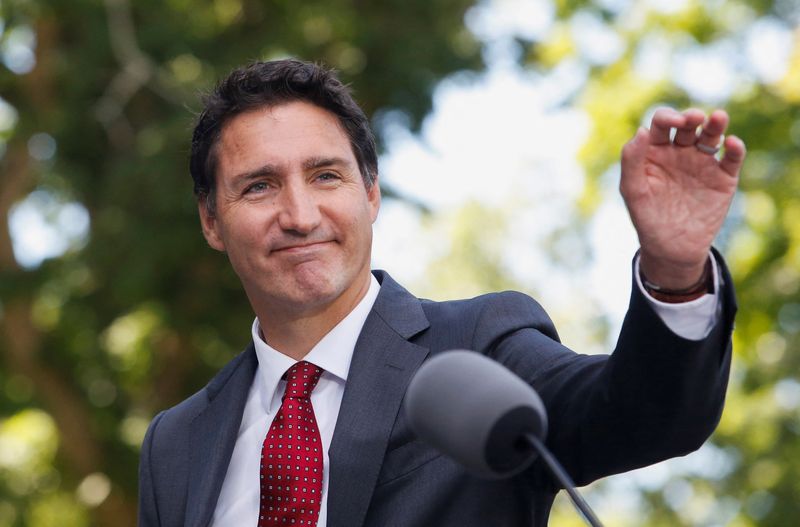Canada’s Conservatives set to embrace populist to take on Trudeau
2022.09.01 13:18

Canada’s Prime Minister Justin Trudeau leaves after a cabinet shuffle in Ottawa, Ontario, Canada, August 31, 2022. REUTERS/Patrick Doyle
By Steve Scherer
OTTAWA (Reuters) – Canada’s Conservatives next month look set to embrace a career politician who has promised to fire the central bank governor and promoted bitcoin as an inflation hedge to become its fourth leader since 2020.
Having lost three consecutive elections to Liberal Justin Trudeau since 2015, the Conservative Party is keen for a leader like Pierre Poilievre, who is a skilled communicator and unabashedly right leaning, said one strategist who expects him to cruise to victory.
“The math just simply doesn’t really work for any other candidate,” said Garry Keller, a former senior Conservative staffer who is now vice president at public affairs consultancy Strategy Corp.
According to his campaign, Poilievre, 43, has signed up more than 300,000 new Conservative supporters, more than the total number of party members who were eligible to vote in the last leadership race in 2020 and far more than his four rivals.
Poilievre’s campaign did not reply to a request for an interview.
Poilievre’s main competitor is a more traditional Conservative from Quebec, Jean Charest, who has criticized Poilievre’s support for the anti-coronavirus vaccine protesters who occupied the capital earlier this year.
The Conservative party’s former leader, ousted in February, had tried to bring the party toward the political center.
“Pierre Poilievre is unapologetic for being conservative and espousing conservative principles, and that’s what the party and the caucus really wants right now,” Keller said.
The winner will be announced on Sept 10.
Poilievre, who represents a largely rural area south of Ottawa, previously served as a Conservative minister for democratic reform for 16 months until Trudeau, 50, took office.
Before running for leadership, he was largely known for his pointed attacks on the Liberal government in parliament. He has effectively used social media to rail against high inflation, which he calls #JustinFlation because he blames it on Trudeau’s spending, and his campaign rallies have been drawing large crowds.
“He’s a very good communicator,” said David Colletto, CEO of pollster Abacus Data. “That’s not a skill set that every political leader has.”
Poilievre made firing Bank of Canada Governor Tiff Macklem one of his main campaign promises, blaming the central bank’s pandemic bond buying for stoking price increases.
While Trudeau’s support from the left-wing New Democrats means an election could come as late as 2025, pollsters said Poilievre would be a formidable opponent, especially if Trudeau runs for a fourth time.
Some 55% of Canadians believe it is time for a change in government, including 16% of Liberals, according to an Angus Reid Institute poll from July.
“There’s a sense of fatigue with the government,” said Shachi Kurl, president of Angus Reid, and Poilievre is tapping into a growing sense of discontent.
“There is a level of disengagement and disenfranchisement today, and there are people… who are looking for something profoundly different, and Poilievre of represents all of those instincts,” she said.








